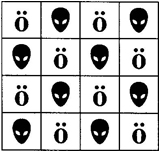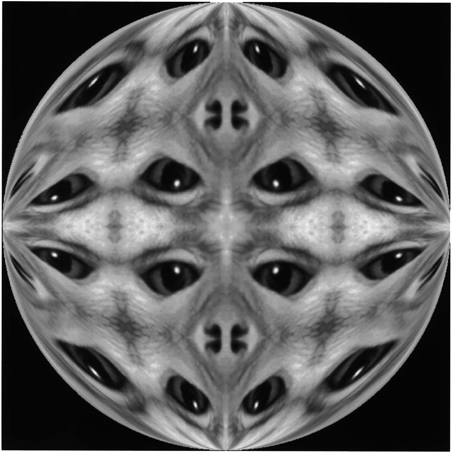

Reflect upon God’s creation but not upon his nature or else you will perish.
—Islamic Hadith
Consider a finite being, Mr. Plex. By “finite,” I mean that Mr. Plex is not omnipotent and not omniscient. Let’s also assume that the finite Mr. Plex carries out a particular act; in this case, he lights the fuse on a bomb.
Next consider two statements:
1. Mr. Plex lights the bomb.
2. Mr. Plex is the only being who knows that 1 is true.
Now consider an omnipotent being, Dr. Eck. Assume that by calling Dr. Eck omnipotent, we mean that Dr. Eck can create any finite being. That means that Dr. Eck can create Mr. Plex. Dr. Eck can create Mr. Plex, who performs the act of lighting a bomb, which is known only to himself and to no other being. Now consider that Dr. Eck is also omniscient. I’m sure you can see the problem. Dr. Eck’s omniscience seems to mean that for any finite being and for any act, if the being does the act, then Dr. Eck knows the being did the act. If this is true, then Dr. Eck cannot create Mr. Plex. Why? If Dr. Eck created Mr. Plex, then by statement 1 Mr. Plex lights the bomb and by statement 2 Dr. Eck does not know that Mr. Plex lit the bomb. If Dr. Eck does not know that Mr. Plex lit the bomb, then Dr. Eck is not omniscient. If Dr. Eck is an omniscient being, he cannot create a being like Mr. Plex, who performs an act known only to himself and no other being.
Because an omnipotent being can create Mr. Plex and an omniscient being cannot create Mr. Plex, we have an apparent contradiction. A being who is both omnipotent and omniscient is logically impossible. Dr. Eck cannot be both omnipotent and omniscient.
The paradox in this chapter and the next was discussed in depth by Richard R. La Croix, professor of philosophy at the State University of New York at Buffalo.1 We can pursue the paradox of Dr. Eck even further. Let us consider that Dr. Eck is mutably omniscient. This means that Dr. Eck at some time knows everything there is to be known at that time, while it also remains possible that at some other time there is something Dr. Eck does not know. Given this, it is possible that Dr. Eck could create on November 16, 2015, Mr. Plex, who performs the act of lighting the bomb, and this act is known only to Mr. Plex, because Mr. Plex must perform the act sometime after November 16, 2015. Once Mr. Plex lights the bomb, Dr. Eck is not omniscient. Note that the mutably omniscient Dr. Eck could create Mr. Plex while possessing the property of being omniscient. This seems to mean that a being can actually be both omnipotent and omniscient. Dr. Eck could create Mr. Plex. However, Dr. Eck must be mutably omniscient for this to work. Traditional religions still live with the logical impossibility of God being both omniscient and omnipotent, because the God of most religions is fully omniscient, not mutably omniscient. God is usually not considered omniscient on a part-time basis.
MUSINGS AND SPECULATIONS
The temper of the hot and superstitious part of mankind in matters of religion is ever to be found of mysteries, and for that reason to like best what they understand least.
—Saint Athanasius (293–373)
The God of Jews and Christians tends to be a personal God who does many of the activities that humans do: He sees, hears, speaks, loves, judges, punishes, creates, destroys, and becomes jealous and angry. The God of mystics and traditional theists usually yearns to be known by His creatures. The Spanish philosopher Joseph ibn Saddiq (d. 1143) suggested that the only thing we can say about God is that He is incomprehensible, transcending our powers of intellect. The Spanish physician Judah Halevi (1085–1141) suggested that God could not be proved using logic; however, this did not mean that faith in God was irrational but simply that a logical demonstration of His existence had no religious value.2
The Koran implies that God has knowledge, but we do not know quite what this means because our human concept of knowledge is insufficient. God cannot be compared to any of the things that exist.3
Various philosophers and theologians have formulated definitions and attributes of God. Here’s a sampling, many of which are scattered through Karen Armstrong’s A History of God. All of these descriptions and definitions make us wonder if it is possible to know much about an incomprehensible God. What is God?
• Marcion (100–165): The God of the Jewish scriptures is cruel, exterminating large populations.
• Clement of Alexandria (150–215): Jesus has become human “so that you might learn from a man how to become God.”
• Saint Basil (329–379): “It is by God’s energies that we know our God; we do not assert that we come near to the essence itself, for his energies descend to us but his essence remains unapproachable.”
• Gregory of Nyssa (335–395): “The true vision and the knowledge of what we seek consists precisely in not seeing, in an awareness that our goal transcends all knowledge.”
• Pope Gregory the Great (540–604): We can make no predictions about God’s behavior. “Then only is there truth in what we know concerning God, when we are made sensible that we cannot fully know anything about him.”
• Scotus Erigena (810–877): God is nothing. He is more than being. Every one of His creatures is a theophany, a sign of His presence. We cannot see God as He is because God, by human standards, does not exist. We only see the God that animates our world as revealed in forests, butterflies, and the tears on a little girl.
• Abu al-Hasan ibn Ismail al-Ashari (878–941): “Allah has a body … Radiating with light … Shining as a round pearl.”4
• Saint Anselm (1033–1109): God’s existence can be proven. He is “something that which nothing greater can be thought.”
• Thomas Aquinas (1225–1274): “All that man knows of God is to know that he does not know Him, since he knows that what God is surpasses all that we can understand of Him.”
• Isaac Luria (1534–1572): God created sleep so we can dream. In dream states we can gain insights that are unavailable to the normal conscious mind.
• John Milton (1608–1674): According to Paradise Lost, Jesus and God are totally separate individuals who must talk to each other for extended periods to understand each other’s intentions.
• Baruch Spinoza (1632–1677): The ancient Israelites called anything they could not understand “God,” but in actuality God is inseparable from reality. God’s activity in the universe is simply a description of mathematical and physical laws.
• Samuel Reimarus (1694–1768): Jesus’s goal was to create a godly state on Earth, but His mission failed and He died in despair. Jesus in the Gospels never directly said He had come to atone for the sins of humanity.
• Immanuel Kant (1724–1804): Human brains can only understand things and phenomena that exist in space and time. They cannot understand other realities.
• Sigmund Freud (1856–1939): God is a projection of the unconscious. The study of psychology is necessary to decode these projections. A personal God was a father figure created by our desires for justice and love.
• Brethren of the Free Spirit (late medieval heretics): God is all that is. God is in every stone and in each limb of the human body. Every created thing is divine.5
• The Ranters (Christian sect in Cromwell’s England, seventeenth century): Every human will return to God as a raindrop returning to a lake. God knows all things. There is no distinction between God and humans. If God is everything, then sin is nothing. Ranters deliberately tried to demonstrate this by cursing in public and violating traditional sexual mores. Outward forms of religion are rejected. Even the Bible is not the Word of God. (Ranters paraded nude in public. Some Ranters found God within themselves, gave up work, lived in voluntary poverty, and reveled in obscenity and promiscuity.)
• Hasidism (started in the twelfth and thirteenth centuries): God has disintegrated and we must build him anew.
• God (–∞ – +∞): “I am What I am.”
• Jewish mystics: “Everything is in Thee and Thou art in everything; Thou fillest everything and dost encompass it; when everything was created, Thou was in everything; before everything was created, Thou wast everything.”6
• Islamic mystics: “I [God] was a hidden treasure; I wanted to be known. Hence, I created the world that I might be known.”7
• Bahaullah, the prophet founder of the Baha’i faith (1817–1892): “To every discerning and illumined heart it is evident that God, the unknowable Essence, the divine Being, is immensely exalted beyond every human attribute, such as corporeal existence, ascent and descent, egress and regress.… He is and hath ever been veiled in the ancient eternity of His Essence, and will remain in His Reality everlastingly hidden from the sight of men.”
Karen Armstrong in A History of God writes,
Human beings are the only animals who have the capacity to envision something that is not present or something that does not yet exist but which is merely possible. The imagination has thus been the cause of our major achievements in science and technology as well as in art and religion. The idea of God, however it is defined, is perhaps the prime example of an absent reality, which despite its inbuilt problems, has continued to inspire men and women for thousands of years.8
The physicist Isaac Newton (1642–1727) believed in God, and he thought God purposely had prevented the gravity of all the stars from pulling them together into one giant spherical mass.9 God had carefully dispersed the stars throughout space with sufficient intervening distances to forestall a gravitational collapse. Although he does not mention the Bible, here is what Newton had to say more generally about God’s omniscience and omnipotence in his Principia Mathematica, published in 1687:
This most beautiful system of the sun, planets, and comets could only proceed from the counsel and dominion of an intelligent and powerful Being. And if the fixed stars are the centers of other like systems, these, being formed by the like wise counsel, must be all subject to the dominion of One.… It is the dominion of a spiritual being which constitutes a God.… And from his true dominion it follows that the true God is a living, intelligent and powerful Being.… He is eternal and infinite, omnipotent and omniscient; that is, his duration reaches from eternity to eternity; and his presence from infinity to infinity; he governs all things, and knows all things that are or can be done.… He endures for ever, and is every where present; and by existing always and every where, he constitutes duration and space.… In him are all things contained and moved; yet neither affects the other: God suffers nothing from the motion of bodies; bodies find no resistance from the omnipresence of God.… As a blind man has no idea of colors so we have no idea of the manner by which the all-wise God preserves and understands all things. He is utterly void of all body and bodily figure, and can therefore neither be seen, nor heard, nor touched; nor ought to be worshipped under the representation of any corporeal thing. We know him only by his most wise and excellent contrivances of things.… [W]e reverence and adore him as his servants; and a god without dominion, providence, and final causes, is nothing else but Fate and Nature. Blind metaphysical necessity, which is certainly the same always and everywhere, could produce no variety of things. All that diversity of natural things which we find suited to different times and places could arise from nothing but the ideas and will of a Being necessarily existing.10
If Newton believed that space was infinite, where did God reside? Newton felt that space was formed by God’s omnipresence. God is the spacetime in which we operate. God created matter by an act of will when He decided parts of space should have form.11
As for myself, I continually wonder what a “god” might be like. I use the analogy of my 110-gallon aquarium. I clean the water, feed the fish, turn on the lights, add medications, adjust the temperature and pH, and so forth. One might be tempted to say that to the fish, I am God. But hold on. I am not a god to the fish. Although they can sense my presence, they are not capable of considering me a god. They have no concept of God. Their minds are too small. They see a stimulus and react. If we extend the analogy to a relationship between us and a higher Being, we too would not be capable of considering that higher being as He truly is, whether God or not.
* * *
Here are a few odd questions for further thought. Consider an omniscient Dr. Eck (ö). Then consider Dr. Ick (o), who is mutably omniscient, as defined earlier in this chapter. How difficult would it be for Dr. Ick to masquerade as Dr. Eck? Could a mutably omniscient being appear to be omniscient to us? What if Dr. Ick were mutably omniscient at regular intervals of time, for example, changing every ten years? For example, consider that for a period of ten years God is omniscient. For the next decade He is not omniscient, and so forth. Could you accept a God with such an oscillation? Certainly, the oscillating God would still be very impressive by mere human standards. In fact, I once wrote a science fiction tale in which the period of oscillation followed the Fibonacci sequence of numbers: 1, 1, 2, 3, 5, 8, 13, 21, 34, 55, 89, 144, 233, 377,… These numbers are such that, after the first two, every number in the sequence equals the sum of the two previous numbers. As you can see, the periods of time for which God is either omniscient or not omniscient become increasingly long, which tends to make the finite beings in my tale have a very confusing and complicated relationship with their God. More complex yet is a story I wrote about a God that is a hive organism consisting of omniscient and mutably omniscient members all oscillating at different rates:

Hive God with Omniscient (ö) and Mutably Omniscient (alien head) Components
Although various members of the God hive were omniscient at the same time, this did not mean that they had to have identical personalities (Figure 15.1). Omniscience implies knowing all, but it does not imply responding in the same fashion to the knowledge. Various arguments broke out within the God collective, and just as with today’s U.S. Senate, compromise resolutions to problems were exceedingly difficult. These kinds of interactions between the omniscients and mutably omniscients prompted one of my readers to suggest that a collective or hive might have been preferable to a “jealous” Old Testament God because, perhaps, cooler “alien heads” would have sometimes prevailed. Arguments between the omniscients and mutably omniscients might be considered not as conflict but as a form of problem solving. Given what you know about the paradox of omniscience discussed in Chapter 1, do you expect the omniscients or the mutably omniscients to win a hypothetical battle or dispute between one another?

Fig. 15.1. Artistic rendition of a hive being with omniscient and mutably omniscient components.
Some people think of God … busily tallying the fall of every sparrow. Others—for example, Baruch Spinoza and Albert Einstein—considered God to be essentially the sum total of the physical laws which describe the universe.
—Carl Sagan, Broca’s Brain